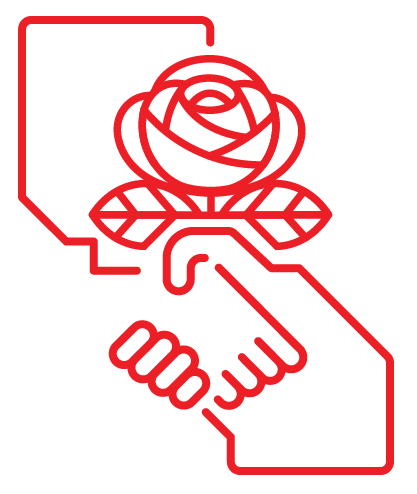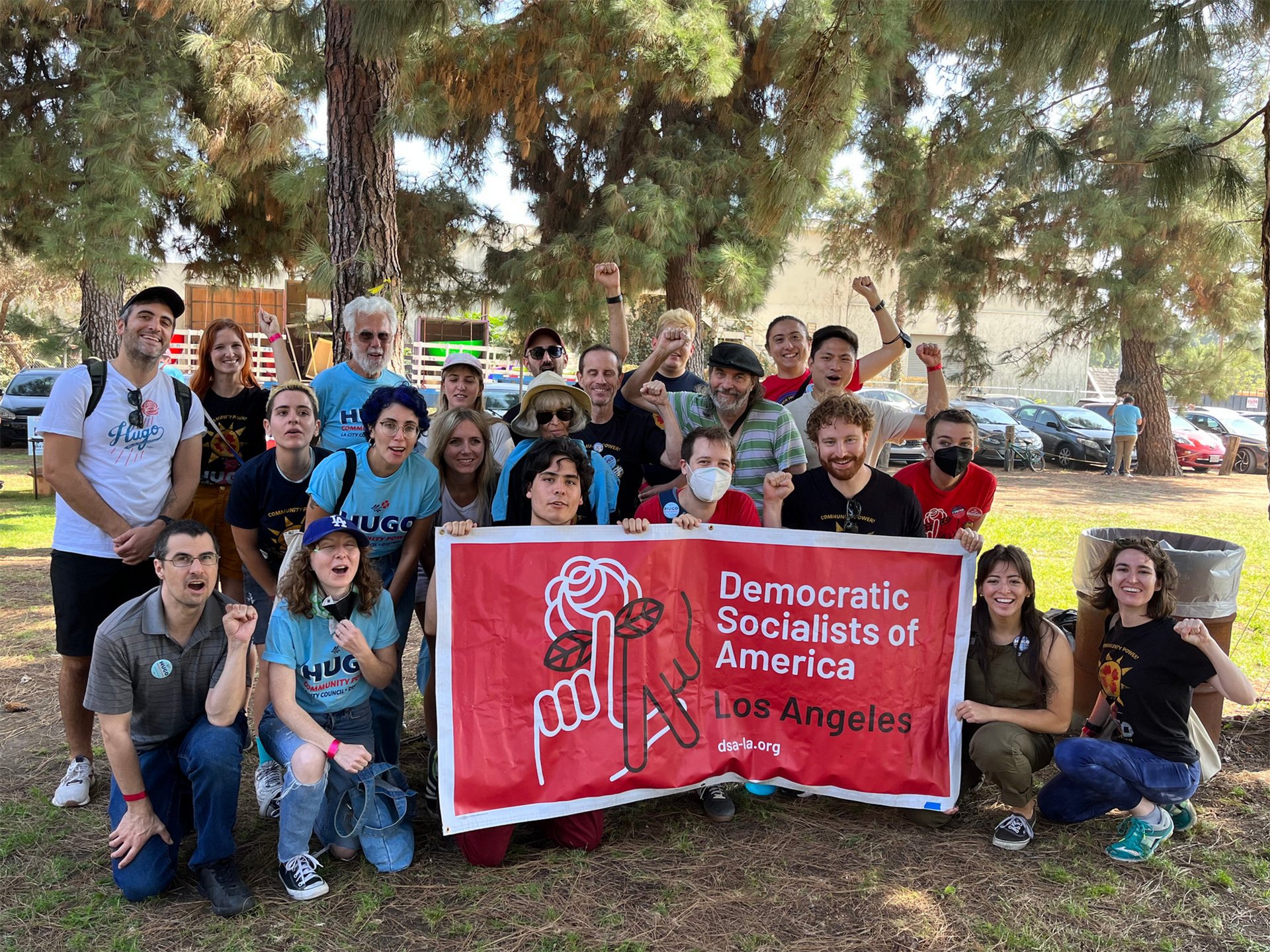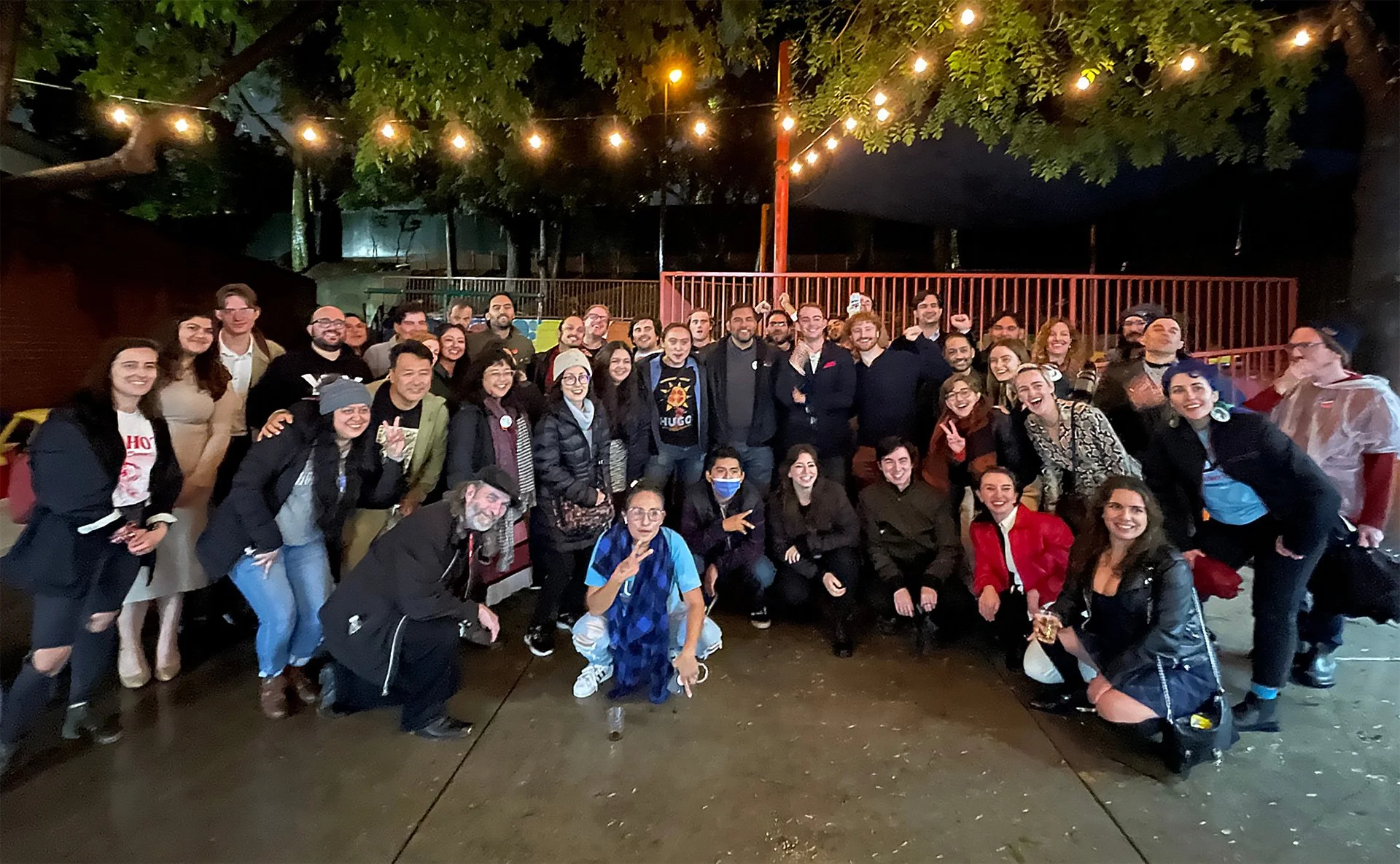Winning Elections in Los Angeles
A few of the DSA-LA activists who came out and campaigned.
In November 2022, Hugo Soto-Martinez, a fifteen-year labor organizer with UNITE HERE Local 11 and one-time elected DSA-LA working group leader, was elected to Los Angeles City Council with a fifteen-point lead over the incumbent. In doing so, he became the third DSA-LA-endorsed member (after Eunisses Hernandez in June 2022 and Nithya Raman in November 2020) elected to the fifteen-person council and the third to unseat a more conservative incumbent – a feat that prior to 2020 had not been achieved in 17 years. This victory, with DSA members now holding ⅕ of the Los Angeles council’s seats, was a result of three key interconnected factors in Los Angeles politics: macropolitical trends that made left political platforms more popular and viable among the Angeleno voting base, three powerful, well-run, and volunteer-driven campaigns by our three candidates, and crucially, intentional and thoughtful work by DSA-LA to maximize our organizational strengths and political opportunities.
Prior to 2020, DSA-LA had only participated in one clearly successful electoral campaign: the re-election of long-time socialist and one-time city councilmember Jackie Goldberg to the Los Angeles school board. In doing so, the chapter also strengthened our existing relationship with United Teachers Los Angeles (UTLA), the local teachers’ union coming off a massively successful strike and aiming to fight back against pro-school-privatization forces on the school board. In late 2019, the chapter endorsed Nithya Raman, a member who had previously founded a homelessness nonprofit that had worked in coalition with DSA-LA’s housing and homelessness projects. Through the Raman and simultaneous DSA for Bernie campaigns, DSA-LA grew our member capacity and skills for running strong canvassing operations, but we still had a ways to go in pushing DSA-LA’s electoral strategy forward; the Raman campaign did not heavily feature explicitly socialist politics, the district was not in LA’s most DSA-member-dense or working class neighborhoods, and DSA-LA was simply one relatively small part of the successful campaign.
However, in late 2020, DSA-LA undertook a project to intentionally sharpen our electoral strategy ahead of the 2022 electoral cycle, which would be the first time in decades that eight Council seats were elected during midterm years, instead of off-year municipal elections. That project, which passed as one of three Priority Resolutions at the chapter’s 2020 Local Convention, called for the chapter to, among other things, construct a comprehensive “Democratic Socialist Program for Los Angeles” to outline local winnable demands that endorsed electeds would be measured against, to intentionally power map electoral districts across Los Angeles County to identify the most strategic and winnable races, and to prioritize identifying and developing candidates from our membership, in coalition with local labor unions and other community groups.
These projects were executed by the chapter’s newly-revamped Electoral Committee. To powermap, the committee brought in a handful of chapter member volunteers and collected key data about every elected district in the county: the number of DSA-LA members in-district, the 2020 Presidential Primary election results, total registered voters, and results on two key 2020 ballot measures. By combining these data, we were able to rank every district and municipality in the county based on how receptive its voters would be to democratic socialist candidates. We found that in Los Angeles, City Council Districts 1 and 13 (now occupied by DSA members Eunisses Hernandez and Hugo Soto-Martinez) were far and away the most friendly districts; in the Los Angeles Board, District 2 which is now occupied by DSA-LA member Dr. Rocío Rivas was the second-friendliest district after Jackie Goldberg’s District 5.
DSA-LA helped boost its endorsed City Council candidate, Hugo Soto-Martinez, over the top in November 2022.
Simultaneously, the chapter undertook a months-long process to draft a Democratic Socialist Program for Los Angeles. Through a collaborative process, the committee collected feedback from all of the chapter’s committees and branches to prepare a program, which identified the key powers, a “status quo coalition” ruling the current political landscape of Los Angeles, set an objective for the chapter to build a new alternative socialist political pole, in collaboration with key political allies (most significantly organized labor), as well as an intentionally limited platform of non-federal policy demands, achievable in the near future, that future DSA-LA socialists in office could be measured against. The tactical aspects of this program came into effect almost immediately, with then-Council Candidate Hugo Soto-Martinez successfully campaigning to pull portions of Los Angeles’ organized labor away from their traditionally conservative support for incumbents, and then-LAUSD board candidate Dr. Rocío Rivas cruising victory against a well-funded incumbent on the back of support from DSA-LA and UTLA.
There is certainly a long list of other factors that contributed to DSA-LA’s electoral success, from the alignment of municipal elections with federal elections, Bernie Sanders’ massive success with Latinx voters, the hard work of DSA-LA organizers in non-electoral campaigns as well as the campaigns themselves, and growing dissatisfaction pushed over the edge by the pandemic and 2020 uprisings among Angeleno voters with the status quo coalition that has ruled the city since the early 2000s. But the chapter’s ability to take maximum advantage of these conditions rested on several key strategic choices that we believe can be replicated to different degrees: carefully assessing the political conditions in the region, with a particular focus on which districts were empirically sympathetic to democratic socialism, clearly identifying a political program that laid out the strategic position we hope to achieve and with a corresponding political platform that intentionally limited our demands to those winnable within a concrete timeframe, and growing the strength of our existing coalitional relationships and membership, most especially with organized labor. These factors have not only brought us more success at the ballot box, but have further set us up to succeed for the long term as we build the next stage: a socialist-labor political pole that can govern in Los Angeles.


